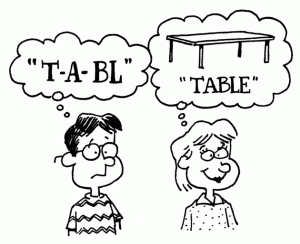 Although spelling may not be an
actual subject that is taught at length in elementary schools, basics are
required in order to improve. Being able to link sounds and letters when
writing is an important skill to have and unfortunately, most students today
are instead being told to write words the way that they sound. In my opinion,
this new way of learning how to spell is only going to cause everyone more
grief in the future. Put it this way, if everyone beings writing words the way
that they sound, it’ll seem as though everyone will be writing in their own
language.
Although spelling may not be an
actual subject that is taught at length in elementary schools, basics are
required in order to improve. Being able to link sounds and letters when
writing is an important skill to have and unfortunately, most students today
are instead being told to write words the way that they sound. In my opinion,
this new way of learning how to spell is only going to cause everyone more
grief in the future. Put it this way, if everyone beings writing words the way
that they sound, it’ll seem as though everyone will be writing in their own
language. Spelling
used to be one of the top priorities in all elementary schools. Unfortunately,
that is not the case anymore. There are very few teachers that are taking the
time to enforce proper spelling and grammar and it is making for a lot of
confusion for both teachers and students.
Spelling
used to be one of the top priorities in all elementary schools. Unfortunately,
that is not the case anymore. There are very few teachers that are taking the
time to enforce proper spelling and grammar and it is making for a lot of
confusion for both teachers and students.
Although
spelling tests are being given for the most part every week, I find that
teachers are not taking them as seriously as they should be. Again, from my
experiences with tutoring at Club de
Devoirs, I have noticed that students are making spelling mistakes as they
practice for their dictations at the end of the week. For example, when the
students are told to copy down the words from the board for the upcoming week,
they are copying them wrong right off the bat. In my opinion, teachers
should be ensuring that the students are properly taking note of the spelling
words without any errors or mistakes.
While
discussing basics in spelling, there is a specific tool that students are now
in denial of using. Yes, I am talking about the dreaded dictionary. Being
taught how to properly use a dictionary was something that we were constantly
reminded of throughout elementary school and for most of our generation, it has
become a second reflex to look up a word. Today, students are relying on spell check and similar tools
to correct all of their spelling and grammar mistakes. What they are not realizing is
that these tools will not catch every little mistake, “But until a child has a
functional spelling ability of about a fifth grade level, they won’t have the
knowledge to choose the correct spelling among the options given by the
machine.” (2)
When I was in the fourth grade, I
remember having dictionary races with my teacher all to see who could find the
word the fastest and come up with the proper definition. Hand a student a
dictionary today and they’ll most likely look at you like you have three heads.
 As
mentioned in my previous post, spelling and reading go hand in hand. In order
to be a good speller, you must be a good reader and in order to be a good
reader, you must be a good speller. Once a child learns the basics of phonics
as well as the basic rules of spelling, both spelling and reading will become
skills that require near to no effort. The repetition of constantly writing out
spelling words is the easiest way for a child to remember what the words mean and how to spell them, “…the more deeply and thoroughly a student knows a word,
the more likely he or she is to recognize it, spell it, define it, and use it
appropriately in speech and writing.” (1)
As
mentioned in my previous post, spelling and reading go hand in hand. In order
to be a good speller, you must be a good reader and in order to be a good
reader, you must be a good speller. Once a child learns the basics of phonics
as well as the basic rules of spelling, both spelling and reading will become
skills that require near to no effort. The repetition of constantly writing out
spelling words is the easiest way for a child to remember what the words mean and how to spell them, “…the more deeply and thoroughly a student knows a word,
the more likely he or she is to recognize it, spell it, define it, and use it
appropriately in speech and writing.” (1)
In my
opinion, proper spelling is one of the most important skills that a child will
learn and master throughout their entire education. Although we are learning
spelling every day even when we are not in the classroom, I still find it
important that teachers give their students a proper spelling base while they
are at school.












